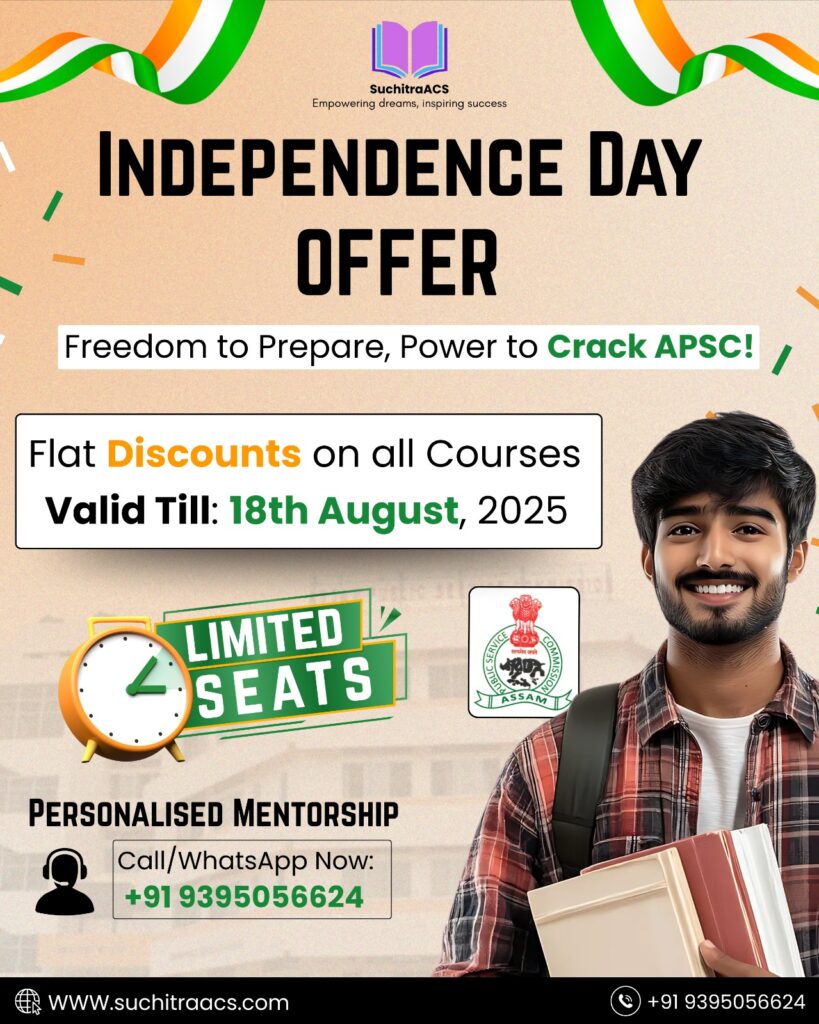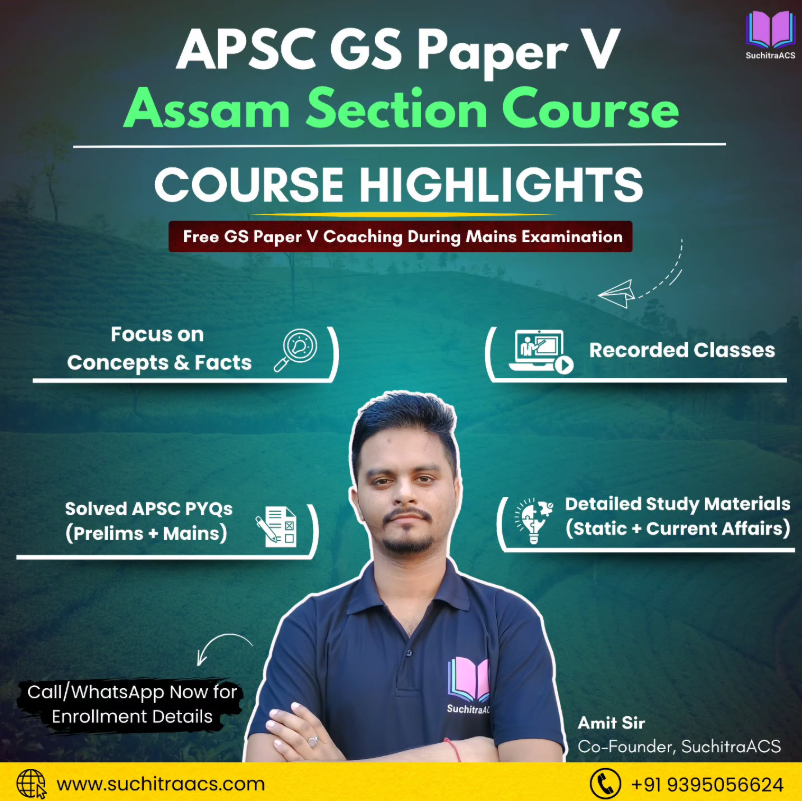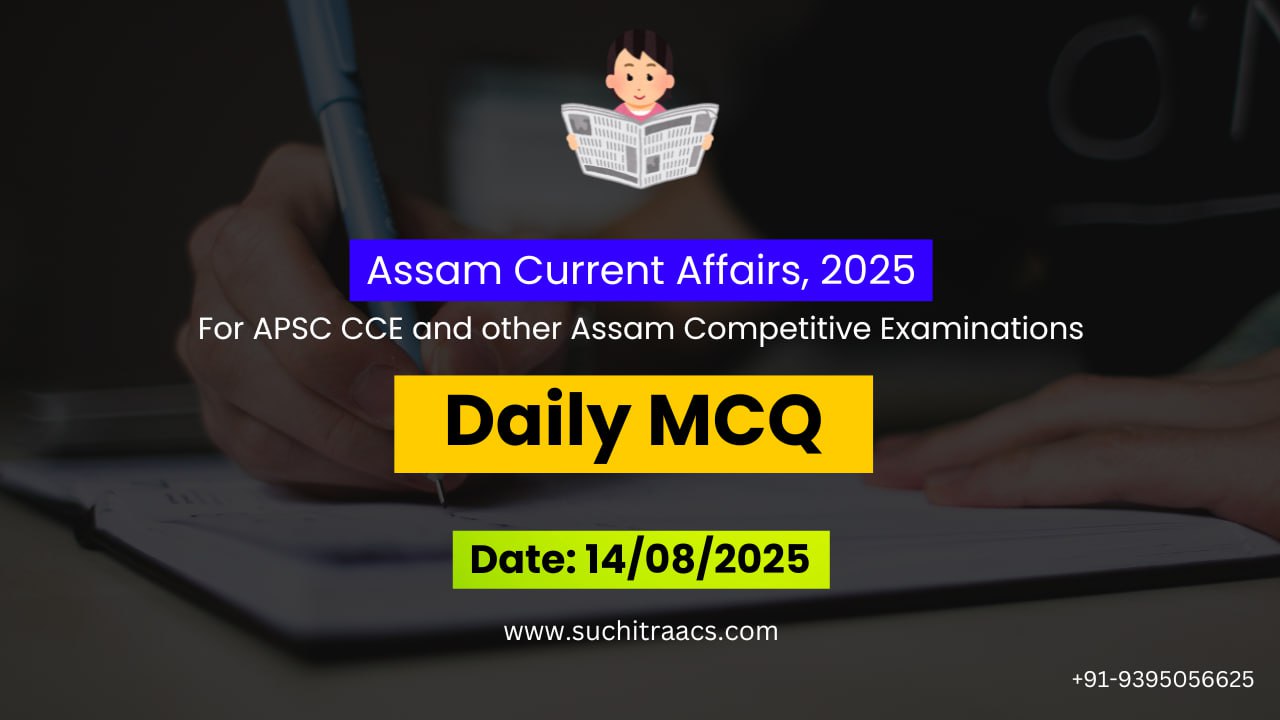APSC MCQs / APSC Prelims Practice Questions based on Assam Tribune (Daily) –14/08/2025
For APSC CCE and other Assam Competitive examinations aspirants, practicing Daily MCQs is vital. This blog covers most important Prelims questions from the Assam Tribune today (14-08-2025). These issues are key for both APSC Prelims syllabus, offering insights into the important topics of current affairs.
✨ APSC CCE Online Coaching, 2026

APSC MCQs / APSC Prelims Practice Questions (Date: 14/08/2025)
Topic 1 – Assam’s First Vande Bharat Express
Q1. With reference to the Vande Bharat Express, consider the following statements:
- It is India’s first indigenously developed semi-high-speed train.
- It operates entirely on diesel-electric locomotives.
- The regenerative braking system used in these trains helps in saving energy.
Which of the statements given above is/are correct?
(a) 1 only
(b) 1 and 3 only
(c) 2 and 3 only
(d) 1, 2 and 3
Answer: (b)
Explanation:
- Statement 1 is correct – Developed under Make in India at ICF, Chennai.
- Statement 2 is incorrect – Operates on electric traction, not diesel.
- Statement 3 is correct – Regenerative braking converts kinetic energy back to electrical energy, improving efficiency.
Q2. Which of the following initiatives is most directly linked to the integration of Vande Bharat Express services with national transport planning?
(a) PM Gati Shakti National Master Plan
(b) Bharatmala Pariyojana
(c) National Electric Mobility Mission
(d) Sagarmala Programme
Answer: (a)
Topic 2 – Assam Organic Farming Policy 2025
Q3. Consider the following pairs:
| Crop/Product | GI Tag in Assam |
| 1. Joha rice | Yes |
| 2. Kaji Nemu | Yes |
| 3. Assam Orthodox Tea | Yes |
Which of the pairs given above are correctly matched?
(a) 1 and 2 only
(b) 2 and 3 only
(c) 1 and 3 only
(d) 1, 2 and 3
Answer: (d)
Explanation:
All three have GI tags — Joha rice, Kaji Nemu (lemon), and Assam Orthodox Tea are registered under the Geographical Indications of Goods (Registration and Protection) Act, 1999.
Q4. The Participatory Guarantee System (PGS-India) often seen in the news is:
(a) An insurance scheme for farmers against crop failure.
(b) A decentralised organic certification system.
(c) A soil fertility enhancement programme.
(d) A minimum price assurance mechanism for organic produce.
Answer: (b)
Topic 3 – Bogibeel–Gohpur Four-Lane Highway Project
Q5. The Bogibeel Bridge, recently in news, connects which of the following?
(a) Dibrugarh in Assam with Pasighat in Arunachal Pradesh
(b) Dhemaji and Dibrugarh districts in Assam
(c) Jorhat in Assam with Majuli Island
(d) Dhola in Assam with Sadiya in Arunachal Pradesh
Answer: (b)
Q6. With reference to the Bharatmala Pariyojana, consider the following statements:
- It is implemented by the National Highways Authority of India (NHAI).
- It focuses exclusively on building expressways between metropolitan cities.
- One of its objectives is to optimise freight movement through economic corridors.
Which of the statements given above is/are correct?
(a) 1 and 3 only
(b) 1 only
(c) 2 and 3 only
(d) 1, 2 and 3
Answer: (a)
Explanation:
- Statement 2 is incorrect – Bharatmala covers feeder routes, border roads, coastal roads, and corridors, not just metro expressways.
Topic 4 – Dibru–Saikhowa Wetland Eco-Tourism Plan
Q7. Dibru–Saikhowa National Park is known for which of the following unique features?
- It is the only Ramsar wetland site in Assam.
- It is home to feral horses.
- It is part of a biosphere reserve.
Select the correct answer using the code below:
(a) 1 and 2 only
(b) 2 and 3 only
(c) 1 and 3 only
(d) 1, 2 and 3
Answer: (b)
Explanation:
- Statement 1 is incorrect – Deepar Beel is Assam’s only Ramsar site.
- Statement 2 is correct – Park hosts feral horses from WWII era.
- Statement 3 is correct – Dibru–Saikhowa is part of a UNESCO Biosphere Reserve.
Q8. Which of the following best defines “eco-tourism” as per internationally accepted principles?
(a) Tourism that prioritises luxury accommodation in natural areas.
(b) Tourism aimed at maximising visitor numbers to protected sites.
(c) Low-impact, responsible travel to natural areas that conserves the environment and benefits local communities.
(d) Any tourism activity conducted in rural areas.
Answer: (c)
✨ APSC CCE Courses, 2025-26 offered by SuchitraACS


🔔 Join Our WhatsApp Study Group!
For exclusive access to premium quality content, including study materials, current affairs, MCQs, and model answers for APSC CCE and other Assam competitive exams.
Click here to join: SuchitraACS Study WhatsApp Group
📚 Want to know more about SuchitraACS’s most affordable courses?
Click here to know more: SuchitraACS Courses for APSC CCE and Assam Competitive Examinations




